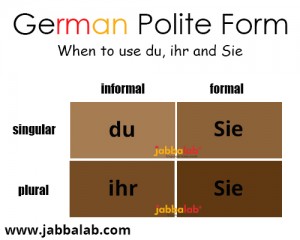German Polite Form
When to use du, ihr and Sie?
In English, there is only one word to say you while in German there are three.
The informal word is du in the singular and ihr in the plural. In the formal form, both singular and plural is Sie.
You can now learn even more on this topic with the help of a fun animation and a grammar quiz. Simply check out our Number Lesson in level A1.
But don’t worry – the rule for when to use each of these three words is quite straight forward and easy to understand. Let’s have another look at German subject pronouns first:
Table: German Subject Pronouns
| German | English | |
|---|---|---|
| Singular | ||
| 1st person | ich | I |
| 2nd person | du / Sie | you (informal) / you (formal) |
| 3rd person | er / sie / es | he / she / it |
| Plural | ||
| 1st person | wir | we |
| 2nd person | ihr / Sie | you (informal) / you (formal) |
| 3rd person | sie | they |
Note: German subject pronouns only have a capital letter when they begin the sentence. The only exception to this is the polite pronoun Sie which always begins with a capital S.
Table: You, formal and informal
| Informal | Formal | |
|---|---|---|
| Singular | du | Sie |
| Plural | ihr | Sie |
Singular Forms
- The word du is used when you talk to one person who you know very well, like your family and your friends. The word du is also used for children.
For example:
Hast du Lust ins Kino zu gehen? ⇨ Do you fancy going to the cinema?
- The word Sie is used when you talk to one person who you don’t know so well or who holds authority over you, like your boss and strangers.
For example:
Entschuldigen Sie, können Sie mir sagen, wo der Bahnhof ist? ⇨ Excuse me, can you tell me where the train station is?
Plural Forms
- The word ihr is used when you talk to more than one person who you know very well.
For example:
Ihr müsst jetzt ins Bett gehen. ⇨ You have to go to bed now.
- The word Sie is also used when you talk to more than one person who you don’t know so well.
For example:
Was möchten Sie trinken? ⇨ What would you like to drink?
| Tip |
|---|
|
In most cases you should start off using the informal du and ihr forms as you will most likely be practising with people you know and interact with often. Get comfortable with these first and then move onto the Sie form. Do not worry if you use the wrong one as you will still be understood. |

